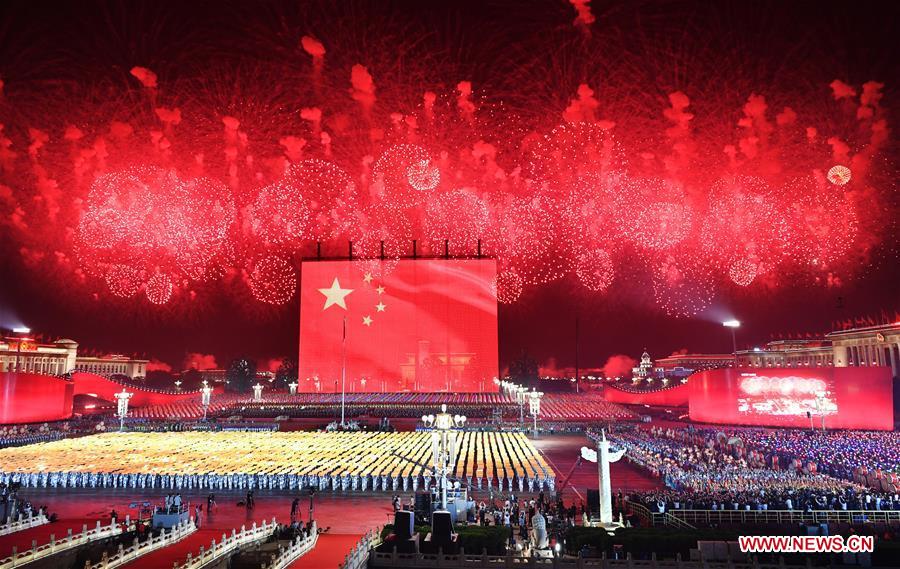A foreigner's view on National Day
- By Mitchell Blatt
 0 Comment(s)
0 Comment(s) Print
Print E-mail China.org.cn, October 2, 2019
E-mail China.org.cn, October 2, 2019

National Day in China in 2012 was a very interesting occasion. It was my first time to be in China during the country's National Day, and I got to see how it was celebrated by Chinese citizens.
That year, the Mid-Autumn Festival and National Day occurred back-to-back. Due to the fact that the former is fixed by the lunar calendar, and the latter according to the Gregorian calendar, it occasional happens that the "two festivals" – shuang jie in Chinese – will occur in close proximity, resulting in an extra-long travel festival.
Apart from the Spring Festival, National Day break is the second busiest travel time in China. During the week-long holiday, folks take trains, planes, buses and nowadays their own cars to head out to famous tourist destinations across the country. According to media reports, an estimated 800 million trips will take place during this year's National Day.
In 2012, I went out to Yunnan to visit a village in Dali county. The village of Shuanglang, which is on the northwestern edge of Erhai Lake is extremely beautiful. It is literally built right next to the lake. You can see the water from some of the guesthouses. You can walk along a boardwalk and sip a beer while looking across at boats and clouds and the villages on the other side.
I stayed at a hostel recommended by a friend who lived in Dali. The hostel, the name of which I cannot remember, and may or may not still exist, was built largely out of wood and had an artfully-designed interior. In the bedroom, the beds were all on platforms of different levels.
Agriculture is one of the major industries in the villages of Dali, and there were a lot of chickens running around the field next to the hostel. I learned two things from living near chickens: First, the sun rises a lot earlier than I had guessed; and second, hens actually start clucking half an hour or longer before it actually rises. Nonetheless, I had to thank the chickens. A few of them fed us well on the Mid-Autumn Festival.
The hostel organized a feast that could be said to celebrate the two festivals at once. They put three long tables together and had some volunteers prepare food starting in the morning. In the afternoon, they set out the tables with a cornucopia of delicious Chinese home-style cooking. Everyone staying at the hostel was invited.
As I was the only foreigner staying at the hostel, the other guests took a particular interest in watching me drink baijiu.
"How does it taste?" they asked.
"Spicy," I said, after choking just a few drops down.
In fact, it was my first time to drink baijiu at a festive feast. Others were taking shots of the whole cup, but I could hardly finish just one shot glass over the course of the meal. After the meal we ate moon cakes and banged drums.
Someone had offered me beer, but I felt it was best to enjoy a Chinese festival with the traditional drink. Ru xiang sui su, as they say. It means, "When you enter the village, do as the locals do."
I felt a little ru xiang sui su about taking part in the celebration of the festivals, especially National Day. I mean, every country's National Day means something to the people of the country and the individual citizens based on how they view its history and values and founding myths. People learn about their country from its unique perspective from a young age and imbibe those stories and symbols. So, I did not know the stories that built the identity of the People's Republic of China. I hadn't learned them growing up.
Celebrating our National Day in the United States, most people go to barbecues, go swimming, and watch fireworks displays in the evening. Most of it doesn't have anything to do with the Declaration of Independence or the Revolutionary War. Yet the beer, the hamburgers, the baseball game on TV in the background of the living room, all of those are symbols of America in the everyday sense of the word.
If you ask me, baijiu, a big feast, hospitality, chickens clucking, and legends about Chang'e flying to the moon are symbols I associate now with China after living here for some years. In the final picture, the goal of a country, no matter what its founding narrative, is to keep its people fed and safe and allow them to do their own things to prosper. The table was full and the moon was bright.
Mitchell Blatt is a columnist with China.org.cn. For more information please visit:
http://www.china.org.cn/opinion/MitchellBlatt.htm
Opinion articles reflect the views of their authors, not necessarily those of China.org.cn.
If you would like to contribute, please contact us at opinion@china.org.cn.






Go to Forum >>0 Comment(s)